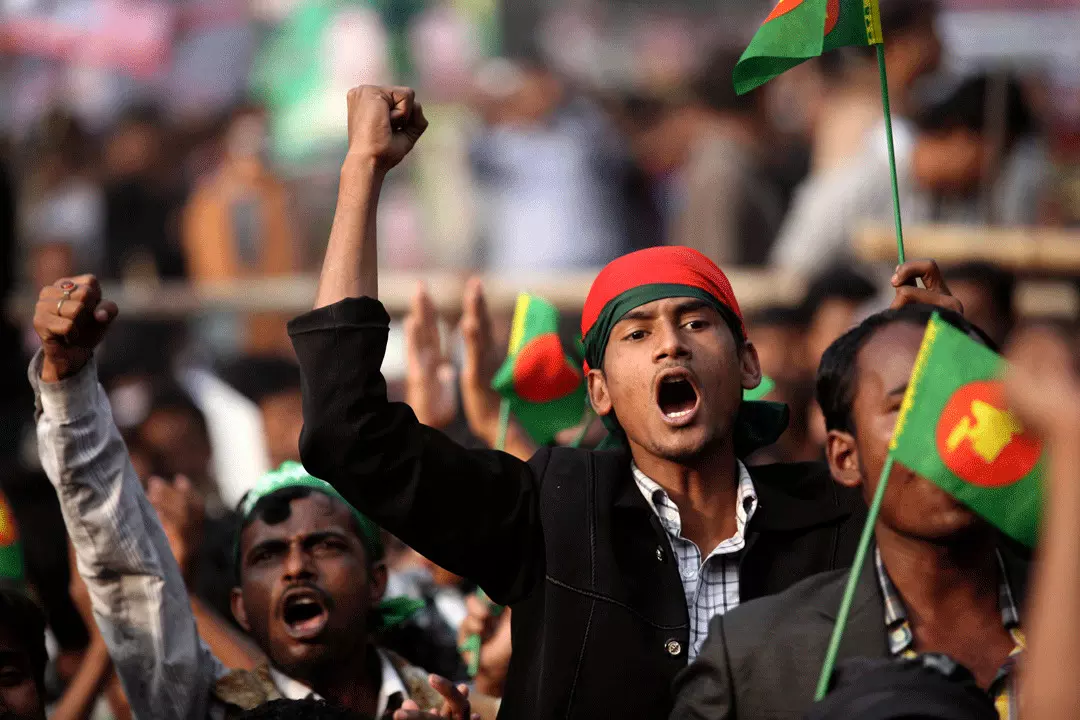Heated polity
As Bangladesh approaches general elections, the ruling party is banking on infrastructural and socio-economic achievements while the opposition is seeking fair contest; writes Snehasis Sur

Andrew Biraj/Reuters
Bangladesh is set to go for general elections at the end of this year or early next year. While the party in power, i.e., Awami League, is keen to return to power, the opposition — Bangladesh Nationalist Party (BNP) — is also in the race. With the council meeting and party elections of Awami League having taken place on December 24, and subsequent council meetings on January 7 and 14, and with the conduct of BNP’s rally on December 10, the preparations for the elections have really geared up.
The Bangladeshi government and the ruling party are trying to showcase all developmental activities — physical and socio-economic — which are visible and recognised. The prime infrastructure projects of the country include Padma Bridge and other bridges, metro railway in Dhaka, building of a tunnel under Karnafuli river in Chittagong town, expansion project of Chittagong port and building of new terminal at Dhaka airport, among others. The major achievement in the socio-economic field is the possible upgradation of Bangladesh from the status of Least Developed Country to a developing one, which is now only a matter of time. The other major socio-economic development parameters, as projected by the Bangladeshi government, show the reduction of poverty level from 40 per cent to 20 per cent, rise of per capita income from USD 543 to USD 2,824 per annum, rise in literacy rate from 45 per cent to 75 per cent, decline of infant mortality rate in 2022 to 21.5, and the reduction in maternal mortality ratio coming to 173 in 2017, a decline of 7 per cent from 2016. Countrywide immunisation programme is also very successful in Bangladesh.
Commenting on the economic situation of the country, Information & Broadcasting Minister Hasan Mahmood told a group of visiting Indian journalists, “we don’t have abject poverty, and the problem of hunger has been tackled even after the Covid crisis”.
While development can be a significant issue in the next election, there are other factors too. Awami League’s General Secretary and the country’s Road Transport Minister Obaidul Quader told Indian journalists, “India will not put us in power but will support us”. India does not have much option but to extend support, as expected by Quader, who further said, “there is no trusted friend of India other than Hasina in Bangladesh”. However, he dubbed the matter of increasing cost of living as one of the major poll issues to be handled.
With an uneasy situation of India’s neighbourhood in the west (Afghanistan and Pakistan), China’s engagement in the north and its aggressive attitude in the Red Sea and Indian Ocean Region, and turbulent situation in Sri Lanka, a very good and friendly relation with Bangladesh is not only India’s priority but also perhaps the only option in India’s foreign policy. China's role is also very significant in Bangladesh. The impact of Chinese investments and its ongoing projects with the presence of their people will definitely have an influence outside the purview of trade, business and construction.
However, India may look for some firm assurances on the issue of safety and security of the minorities in Bangladesh. While the situation is cordial and healthy in the government positions or in academia and intelligentsia, disturbing incidents do take place in different parts of the country. What is expected is the quickest possible response by the law-and-order authorities and also by the ruling party’s local leadership. Definitely there are forces to create such incidents in many places in the entire subcontinent, but in the run up to general elections in Bangladesh, such incidents may crop up in a major way. Though the government and the ruling party have been vigilant, the protection needs to be ensured more at the grassroots level. The feeling of the minority leaders, expressed during their meeting with a visiting Indian journalists’ group from Kolkata last week, outside the Dhakeshwari temple, has clearly been very positive. They shared their firmness that it is their own country and there should not be any question of leaving their motherland but, at the same time, they require some more assurances and comfort which, they know, can only be given by the ruling constellation.
BNP Secretary General Mirza Fakrul Islam Alamgir, the main face of the party, was released on January 9 after a month’s arrest on the charges of instigating violence. With BNP’s poll boycott in 2013, and the party getting only seven seats in the last election in 2018, its participation in the next election has become a major issue of contention, not only for the BNP but also for the ruling constellation to show that the election would be participatory, free and fair. While the Awami League has already announced a coalition, it is to be seen which parties do actually ally with the BNP this time.
Views expressed are personal



